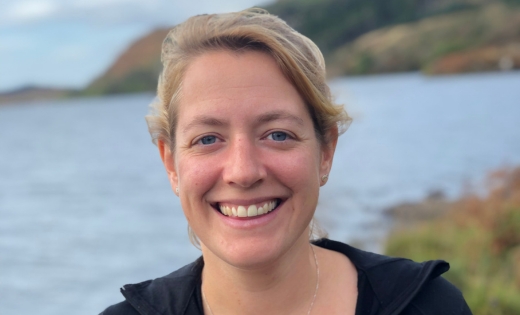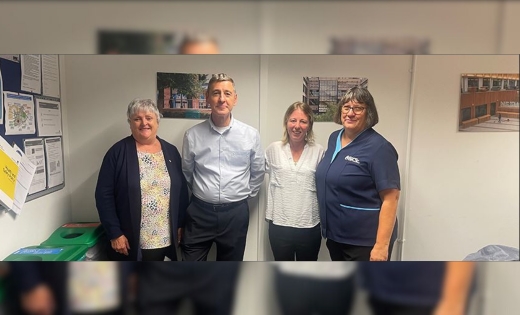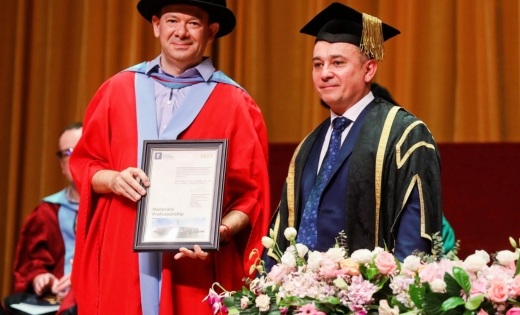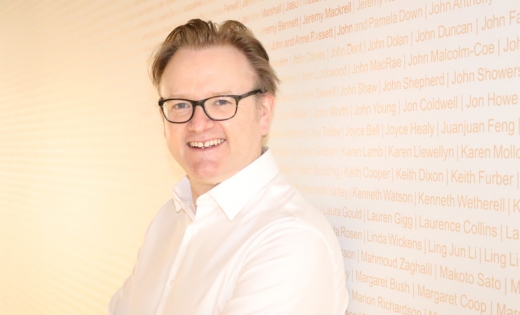Celebrate Our Staff – August 2023
Join us as we celebrate our colleagues’ achievements across the University from the past few weeks.

Featured this month:
- Prestigious fellowship for Geography researcher
- National accreditation for Cleaning Services team
- Dr Rofe’s Ride For Freedom
- Languages academic presents to Parliament
- Key scrutiny role for Law professor
- Joint School head becomes Honorary Professor
- National fellowship for Dan Trowsdale
Prestigious fellowship for Geography researcher

Dr Cat Moody has been awarded an Independent Research Fellowship (IRF) by the prestigious Natural Environment Research Council (NERC).
Dr Moody, Senior Research Fellow from the School of Geography, is one of twelve researchers chosen to participate in the NERC IRF scheme this year.
Providing a total funding of £7.9 million and five years of support, the scheme is designed to develop scientific leadership among the most promising early career environmental scientists.
Dr Moody can now focus on advancing her research into peatlands – a type of wetland with an accumulation of incompletely decomposed plant matter. A large store of carbon, they bring a net-cooling effect and play an important role in climate regulation.
Restoring damaged peatlands is a key climate change mitigation strategy in several countries. Peatland pools are often created during restoration to increase water-holding capacity, which encourages peat formation and carbon storage.
Dr Moody said: “I want my research to make a difference and help in the fight against climate change. This award will give me time to focus on my research to solve a real-world peatland restoration problem, revolutionising restoration practices, and hopefully result in more carbon stored in peatlands.
“I am incredibly grateful for the brilliant support from colleagues and collaborators who helped me win this award.”
Moving forward, Dr Moody plans to investigate the impact of creating peatland pools on carbon and greenhouse gas budgets, comparing their emissions, water chemistry and ecology to naturally formed pools.
NERC also supports fellows in establishing international recognition, and championing equality, diversity, and inclusion within their research environment.
National accreditation for Cleaning Services team

Pictured left to right: Jill Roberts, Head of Cleaning Services, James Atkins, BICSc Verifier, Dawn Abel Training Coordinator and BICSc Assessor, & Denise Hanson BICSc Commercial Director
The University’s Cleaning Services team has become a British Institute of Cleaning Science (BICSc)-accredited training centre.
The accreditation from BICSc shows the University’s commitment to professional standards – only approved after a site and equipment inspection carried out by a BICSc Verifier.
Gaining an Accredited Training Membership also means that the University’s Cleaning Services team can now standardise and deliver staff training to the high level set out by BICSc. This is recognised as a gold standard internationally and across the industry.
Jill Roberts, Head of Cleaning Services, said: “Delivering excellent standards of cleaning and service supports the University in achieving its aims.
“The BICSc accreditation ensures that our highly motivated team can develop professionally and consistently along industry guidelines, and I hope it gives staff and students even more confidence in their fantastic colleagues.
“The first part of the training initiative – the Cleaning Supervisor Certificate – has been very successful and participants feel they have hugely benefitted from it.”
“The relentless hard work, enthusiasm and passion of Dawn Abel, our training coordinator, has been at the forefront of this achievement. Thank you, Dawn!”
James Atkins, Verification and Support Specialist at BICSc, said: “Accreditation requires leadership and direction, drive, and a willingness to learn and adapt to new ideas, whether you have been in the profession for 20 years or 20 months. We encountered all of these qualities and many more while working with Cleaning Services at the University of Leeds.
“It has been a pleasure working with Jill and Dawn and the rest of the team and we look forward to supporting them in the future.”
BICSc is the largest independent, professional, and educational body within the cleaning industry, with over 54,000 individual and corporate members.
Dr Rofe’s Ride For Freedom

Dr Rofe outside the Guggenheim Museum in Bilbao
Dr J Simon Rofe cycled the first stages of this year’s Tour de France to advocate to end modern slavery.
Dr Rofe, from the School of Politics and International Studies, undertook the challenge for the Ride For Freedom organisation days before the Grand Départ left Bilbao.
Ride For Freedom is a non-profit organisation whose mission is ‘to harness the universal appeal of cycling to raise awareness, educate and forge partnerships to end modern slavery, and to provide remedy to survivors.’
The charity’s fundraising cycles raise money for Ride For Freedom’s Freewheel programme, which empowers modern slavery victims to cycle.
Simon, along with the organisation’s founder and team leader Gordon Miller, completed the first three stages of the Tour around Spain’s Basque Country.
The ride saw the pair cover a total distance of 512.81km and climbing 8,149m – totalling 21 hours and 38 minutes of cycling.
Dr Rofe said: “The opportunity to challenge the heinous practice of Modern Slavery, the mission of Ride for Freedom, is one that I was delighted to be part of.
“The opportunity to be on my bike, the 'freedom' that it provides while experiencing the beauty of the Basque Country and the mental wellbeing that provides, is something we shouldn't take for granted while 50 million people globally are subject to Modern Slavery.”
Whilst in the Basque Country, Dr Rofe was also the invited guest of the Basque Cultural Institute at the inaugural World Summit on Sports Diplomacy, which explored the theme of rights and opportunities for the field in the 21st Century.
A leading expert in the field of sports diplomacy, Dr Rofe delivered a keynote lecture on how sports diplomacy can play a role in international relations today.
Languages academic presents to Parliament

Sascha Stollhans has presented his research and emerging policy recommendations on the current state of language education at the House of Lords.
Sascha, from the School of Languages, Cultures and Societies, was invited to present at a language education meeting hosted by the All-Party Parliamentary Group on Modern Languages at the House of Lords on 17 July.
Entitled ‘What's new in the field of languages?’, the meeting featured a series of presentations by academics and organisations on the latest developments in the languages sector.
Sascha co-presented with Professor Michelle Sheehan from Newcastle University on behalf of the national Linguistics in Modern Foreign Language Network, where he co-leads the German Studies strand. The group has carried out extensive research to explore how linguistics could be incorporated into language teaching.
He said: “Languages are an extremely useful tool for communication but learning a language entails so much more: it helps you become a better communicator, even in your first language, and it develops your analytical skills and critical thinking.
“Using linguistics to learn more about language itself, its role in society, the way it changes and varies, can be extremely eye-opening and insightful.
“The UK is already a multilingual society at its very core – this is something to embrace. Linguistics can equip teachers and school leaders with the skills to capitalise on this kind of diversity and make language learning more inclusive.”
At the meeting, he also formally launched the group’s Manifesto for Linguistics in Language Teaching in the UK Context. It calls for the systematic inclusion of linguistics in language teaching and learning as a solution to re-energise language learning in UK state schools, which has been in decline in recent years.
Key scrutiny role for Law professor

Professor Rita de la Feria has been appointed to the advisory panel of the Office for Budget Responsibility (OBR).
Professor de la Feria, from the School of Law, will attend the panel’s first meeting on 5 September.
The OBR provides independent analysis of the UK’s public finances.
The organisation’s advisory panel was initially established in 2011 so leading economic and fiscal experts could develop and scrutinise the OBR’s work programme and forecasting methods.
Earlier this year, its membership was revised and expanded to take in experts across a wider range of fields, including corporate finance, the labour market and climate change.
Professor de la Feria is an expert in tax law and policy and has worked as an adviser to several national governments as they developed their taxation policies.
Her research, including on tax avoidance, is regularly cited by international organisations and courts across Europe.
She will join academics from universities from across the UK, as well as industry specialists on the revamped panel.
Professor de la Feria said: “Tax policy is not something abstract, far-away, removed from everyday life; it is everyday life. It impacts everything we do – investment and jobs, what we buy or do not buy, new hospitals or schools. I am therefore delighted to be joining the OBR’s Advisory Panel, and I look forward to contributing to their work on public finances, and the impact of tax policy therein.”
Members of the panel will share their insights on the OBR’s work and their areas of expertise, as well as providing input on key forecast issues, methods and analysis.
Joint School head becomes Honorary Professor

Professor Dariusz Wanatowski has been awarded an Honorary Professorship from the University of Nottingham in Ningbo, China.
Professor Wanatowski, from the Faculty of Engineering and Physical Sciences, is the Pro-Dean of the Southwest Jiaotong University (SWJTU)-Leeds Joint School.
The Joint School, in Chengdu in the southwestern Sichuan province, was established in 2015 and offers courses in several engineering disciplines.
In his role as Pro-Dean, Professor Wanatowski is the current Head of the Joint School and has been working in Chengdu since 2016.
He is also an international expert in soil mechanics, with his research focusing on advanced laboratory soil and rock testing methods and their applications to design and construction of civil engineering structures.
Professor Wanatowski said: “I am very honoured to be appointed as the Honorary Professor of the University of Nottingham Ningbo China, the first and most successful Sino-British university in China.
“This award will give me an opportunity to collaborate with colleagues in Ningbo on exciting multi-disciplinary research and education projects, which will also contribute to promoting SWJTU-Leeds Joint School to the wider community in China and beyond.”
The University of Nottingham was the first British university to establish a Chinese campus, doing so in 2004.
The SWJTU-Leeds Joint School today takes in 375 students every year, with a new BEng in Materials Science and Engineering being launched this year.
The strength of both Leeds and SWJTU’s engineering faculties was the rationale behind the type of courses on offer, with a joint PhD programme also offered by the School.
More than 40 Leeds staff visit Chengdu to teach every year and some students come to Leeds to study part of their degrees.
National fellowship for Dan Trowsdale

Dan Trowsdale has been recognised for his outstanding contribution to higher education with a National Teaching Fellowship (NTF).
Current Deputy Head of the School of Mechanical Engineering, Dan Trowsdale joined the University 17 years ago, with more than 20 years’ industry experience in his field of product design.
The National Teaching Fellowship scheme celebrates individuals who have made an outstanding impact on student outcomes and the teaching profession in higher education.
Dan’s work focuses on human-centred methods of design-for-learning – using scientific insights to improve teaching and learning.
Accelerated by his fellowship at the Leeds Institute of Teaching Excellence (LITE), his work has incorporated pedagogical tools such as Lego Serious Play®, and EdVee, to better develop learning experiences.
Since 2015, he has been involved with the expansion of online learning at Leeds, including developing Massive Open Online Courses (MOOCs) with over 100,000 enrolments and a recent flagship module for the fully online Masters in Engineering Management.
Dan said: “I’ve been inspired for many years by the work of colleagues who are already NTFs, so I’m thrilled and proud to be recognised alongside them. The award has boosted my confidence enormously.
The school, LITE and the Teaching and Learning in Engineering Network (TALENT) has been significant in supporting my development leading up to this fellowship. It’s a real privilege to work alongside such colleagues at the University, to be able to enjoy the mental space to develop and to have such world-class support.”
Read more about Dan’s Fellowship.
Get in touch!
We know there are lots of great things happening to support the work of the University – and we want to hear about them!
Please follow the staff Twitter account to see the latest updates and copy in our @UniLeedsStaff handle when posting success stories, so we can share them with colleagues.
You can also contact Internal Communications and Engagement directly at internalcomms@leeds.ac.uk if you or one of your colleagues would like to appear in this monthly feature. This is open to all staff – professional and academic.
Posted in: University news